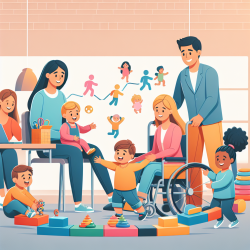As a practitioner focused on improving outcomes for children with cerebral palsy (CP), it is crucial to understand the multifaceted impacts of therapeutic interventions. A recent qualitative study by Prest et al. (2022) provides valuable insights into the benefits of play-based groups for children with CP and their parents, particularly mothers. The study, titled "Play-based groups for children with cerebral palsy and their parents: A qualitative interview study about the impact on mothers' well-being," offers evidence that these groups can significantly enhance the well-being of mothers, thereby positively influencing the overall family dynamic.
Here, we will explore the key findings from this study and discuss how practitioners can implement these insights to enhance their therapeutic approaches.
Key Findings
The study conducted semi-structured interviews with ten mothers whose children attended play-based groups. The researchers identified four main themes that encapsulate the mothers' experiences and the subsequent impact on their well-being:
- Practical Support: The groups provided mothers with essential practical support, including strategies for managing their child's condition and navigating daily challenges.
- Connecting with Others: Mothers valued the opportunity to connect with other parents facing similar challenges, which helped reduce feelings of isolation and provided emotional support.
- Transitioning Journeys: The groups facilitated smoother transitions for both children and parents, helping them adapt to new stages of development and changes in care needs.
- Different Motivators, Different Experiences: Mothers' experiences varied based on individual motivators and personal circumstances, highlighting the need for tailored support.
Practical Implications for Practitioners
Based on these findings, practitioners can take several steps to enhance their therapeutic approaches:
1. Provide Comprehensive Practical Support
Ensure that play-based groups offer practical resources and strategies tailored to the specific needs of children with CP. This includes providing information on managing daily routines, handling medical appointments, and accessing additional services. By equipping parents with practical tools, practitioners can help alleviate some of the stress associated with caregiving.
2. Foster Social Connections
Encourage the formation of supportive networks among parents. Facilitating regular group meetings, both online and in-person, can help parents share experiences, offer advice, and provide emotional support. Consider creating online forums or social media groups where parents can connect outside of formal sessions.
3. Support Transitional Periods
Assist families in navigating transitional periods, such as starting school or moving to a new care setting. Providing guidance and resources during these times can help families adapt more easily and reduce anxiety. Tailored support plans that address the unique needs of each family can be particularly beneficial.
4. Tailor Support to Individual Needs
Recognize that each family's experience is unique and requires individualized support. Conduct regular assessments to understand the specific needs and preferences of each family. This personalized approach ensures that interventions are relevant and effective, ultimately improving outcomes for both children and parents.
Encouraging Further Research
While the study by Prest et al. (2022) provides valuable insights, there is a need for further research to explore the long-term impacts of play-based groups on parental well-being. Practitioners are encouraged to participate in or initiate research studies that investigate different aspects of these interventions. Potential areas of exploration include:
- The impact of play-based groups on fathers and other caregivers
- Long-term outcomes for children who participate in these groups
- The effectiveness of different types of play-based activities
- Comparative studies of in-person versus online play-based groups
By contributing to the body of research, practitioners can help develop more effective interventions and improve the quality of life for families affected by CP.
Conclusion
Implementing the insights from the study on play-based groups for children with CP can significantly enhance the well-being of parents, particularly mothers. By providing practical support, fostering social connections, supporting transitional periods, and tailoring interventions to individual needs, practitioners can create a positive impact on the entire family. Furthermore, engaging in ongoing research will help refine these interventions and ensure they meet the evolving needs of families.
To read the original research paper, please follow this link: Play-based groups for children with cerebral palsy and their parents: A qualitative interview study about the impact on mothers' well-being.










